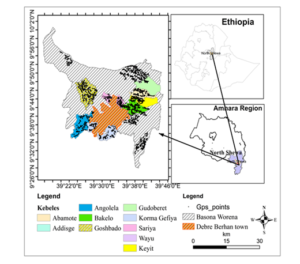The North Shewa Health and Demography Surveillance Site (NS-HDSS)
The NS-HDSS is a health and demographic surveillance site located in the North Shewa Zone of the Amhara Region in Ethiopia. NS-HDSS is owned and administered by St. Paul’s Hospital Millennium Medical College. The HDSS site covers three geo-climatic zones the coldish and less than temperate (cold/ደጋ), the warm and wet (temperate/ወይናደጋ), and the drier and warmer hot/ቆላ). Currently, the NS-HDSS site includes 13 Kebeles, 119 enumeration areas, and over 13,151 households to generate longitudinal information on vital events (birth, death, migration, and marital status changes). The aims of NS-HDSS is to develop and evaluate a system for continuous registration of health, health-related and socioeconomic indicators through population-level longitudinal research. Centrally a team of multidisciplinary health professionals under the community health directorate manages NS-HDSS.

Figure 1: A map for North Shewa Health and Demography Surveillance Site
Field research team
Team composition:
- Field coordinators
- Research supervisors
- Data collectors
Skills and experience:
- Trained on electronic data collection
- Reside in the study area
- Well-versed with NS-HDSS social and cultural values
- Well-versed with the local context
Additional personnel at the central management:
- Dedicated data manager
- Server service managed by the college’s IT department in collaboration with the NS-HDSS team
Data Collection and Management:
The NS-HDSS platform collects data through two main processes:
- Baseline Census:
Conducted in December 2023, capturing the initial health and demographic characteristics of the population.
- Periodic Data Collection:
Conducted at regular intervals to monitor changes in key indicators. The following information is collected during these periodic surveys:
- Demographic variables: Age, sex, marital status, education level, etc.
- Economic information: Income, occupation, assets, etc.
- Housing conditions: Type of dwelling, water access, sanitation facilities, etc.
- Migration status: Recent relocation and reasons for movement.
- Family planning: Contraceptive use and desired family size.
- Maternal and child health: Antenatal care (ANC) utilization, delivery practices, postpartum care (PNC) attendance, childhood vaccinations, and morbidity and mortality rates.
Research Opportunities at the NS-HDSS Platform
A Robust Research Ecosystem:
The North Shewa Health and Demography Surveillance Site (NS-HDSS) presents a unique and valuable platform for health researchers and graduate students seeking collaboration. Our comprehensive infrastructure enables you to conduct high-quality studies with unparalleled ease and access.
Getting access to our resources:
- Ready-to-deploy research teams: Leverage the expertise of trained data collectors, field supervisors, and coordinators who are intimately familiar with the local context and cultural nuances.
-
- Precise sampling: Gain access to a complete sampling frame ensuring accurate and efficient recruitment strategies for your research.
- Comprehensive data repository: Explore a rich baseline and longitudinal data encompassing demographics, economy, housing, migration, family planning, maternal and child health, and mortality/morbidity across ages.
Our Support Every Step of the Way:
- Dedicated data management: Our data management team ensures the integrity and accessibility of your research data, facilitating seamless analysis.
- Collaborative environment: Engage with the central NS-HDSS team, including data management and server access personnel, to navigate the platform and address any queries you may have.
Connect with our team: The NS-HDSS will connect you with fellow investigators and potential collaborators working on diverse health topics. This collaborative environment encourages knowledge sharing and fosters innovative research approaches.
For more information: Contact the NS-HDSS team at SPHMMC to discuss your research collaboration ideas and explore how our platform can be used to advance health research.
